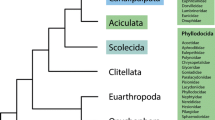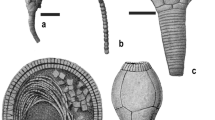
Overview
- Reflects the state of the art in Polychaete polychaete sciences
Part of the book series: Developments in Hydrobiology (DIHY, volume 179)
Buy print copy
About this book
Recently, evidence has been accumulated which shows that some of the groups formerly regarded as independent "phyla" such as Pogonophora (now recognized as Siboglinidae), Echiura, Myzostomida and perhaps Sipuncula, are most probably nothing else than greatly modified Annelida. The extreme morphological diversity found especially in Polychaeta displays the plasticity of a simple segmented organisation that basically is nothing else but a serial repetition of identical units. Thus, annelids are highly important to our understanding of fundamental questions about morphological and adaptive diversity, as well as clarifying evolutionary changes and phylogenetic relationships.
The book aims to summarize our knowledge on Polychaetes polychaetes and their allies and gives an overview of recent advances gained by studies that employed conventional and modern methods plus, increasingly and importantly, the use of molecular markers and computer-assisted kinship analyses. It also reflects the state of art in polychaete sciences and presents new questions and controversies. As such it will significantly influence the direction of research on Polychaeta and their related taxa.
Similar content being viewed by others
Keywords
Table of contents (20 chapters)
-
Front Matter
Editors and Affiliations
Bibliographic Information
Book Title: Morphology, Molecules, Evolution and Phylogeny in Polychaeta and Related Taxa
Editors: T. Bartolomaeus, G. Purschke
Series Title: Developments in Hydrobiology
DOI: https://doi.org/10.1007/1-4020-3240-4
Publisher: Springer Dordrecht
eBook Packages: Biomedical and Life Sciences, Biomedical and Life Sciences (R0)
Copyright Information: Springer Science+Business Media B.V. 2005
Hardcover ISBN: 978-1-4020-2951-6Published: 13 July 2005
Softcover ISBN: 978-90-481-6754-8Published: 09 October 2011
eBook ISBN: 978-1-4020-3240-0Published: 30 March 2006
Edition Number: 1
Number of Pages: XII, 387
Additional Information: Reprinted from HYDROBIOLOGIA, 535-536 (2005)
Topics: Invertebrates, Freshwater & Marine Ecology, Evolutionary Biology, Zoology, Animal Anatomy / Morphology / Histology, Animal Systematics/Taxonomy/Biogeography



